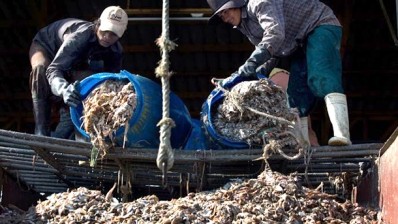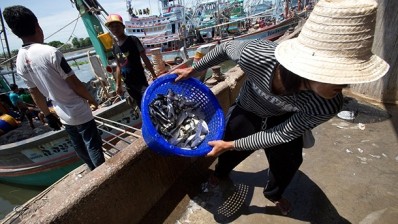Thai seafood companies must ‘wake up’ practices that will stop slavery

Thiraphong Chansiri said Thai Union will now spend millions of dollars to end its reliance on poorly regulated contractors that have been responsible for much of the abuse.
A report by Associated Press earlier this week claimed that poor migrant workers could end up being sold into factories where they are forced to work 16-hour days with no time off and little or no pay.
The report named Thai Union along with other Asia-based prawn companies whose produce is sold by major retailers around the world.
“Pervasive human trafficking has helped turn Thailand into one of the world's biggest shrimp providers,” it said.
“Despite repeated promises by businesses and government to clean up the country's $7bn seafood export industry, an Associated Press investigation has found shrimp peeled by modern-day slaves is reaching the US, Europe and Asia.
The wire also claimed that more than 2,000 fishermen had been freed from slave conditions this year as a result of its ongoing investigative series into slavery in the Thai seafood industry.
Thiraphong, chief executive of Thai Union, said that his company had been powerless to prevent labour suppliers from providing slave labour for its factories.
Despite “great efforts”, the company had been unable to keep labor abuses out of its supply chains. Despite imposing spot checks by third-party auditors and having regular meetings with external suppliers the problem would not stop, he said.
Next year, the company will cease working with all external pre-processors and bring all shrimp processing operations in-house at a cost of around US$5m.
“From January 1 onwards, all processing work will be directly controlled by Thai Union, ensuring that all workers, whether migrant or Thai, are in safe, legal employment and are treated fairly and with dignity,” the company said in a statement.
“This is a positive step towards our goal of ridding the Thai seafood sector of illegal labour practices. the abuse of human rights must not be tolerated,” said Thiraphong.
Panisuan Jamnarnwej, honorary chairman of Thai Frozen Foods Association, said the move was encouraging for the industry in Thailand.
“By bringing pre-processing operations in house, Thai Union will be able to monitor and promote the welfare of their workers directly,” Dr Panisuan said.













